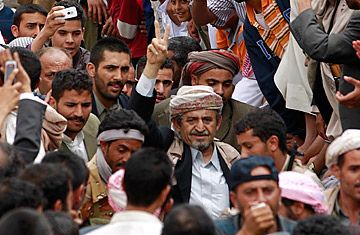
Tribal leader Sadeq al-Ahmar flashes a victory sign as he attends a mass funeral for fighters loyal to him in Sanaa May 27, 2011.
(2 of 2)
"What we're witnessing now is a battle between the two most powerful families in Yemen, a conflict that has been brewing for several years which because of Saleh's stubbornness has come to its head," says Abdullah al-Faqah, professor of politics at Sana'a University. "This was a foolish fight for him [Saleh] to pick... we're now witnessing the worst violence in Sana'a since the civil war in the late 1960's."
Saleh's bickering with the tribes has coincided with what looks like a new effort by the regime to pull the plug on the hundreds of thousands seeking his ouster. On Monday Kalashnikov-wielding security forces opened fire on protesters in Taiz — Yemen's industrial capital and the birthplace of the 1962 revolution — before bulldozing and setting afire their tented sit-in at the city's Tahreer square. Fifty protesters, most of them men in their early 20s, were killed and hundreds of injured were left strewn out on the floor of a field hospital suffering from bullet wounds and burns.
Nevertheless, more and more observers believe the President's days are numbered. On Wednesday, the political risk think-tank Eurasia declared that "Saleh is unlikely to survive 2011 as president of Yemen; however the likelihood of a managed transition is decreasing, and an attempt to forcibly oust Saleh from power is becoming more likely.... Either Saleh leaves power through a political deal he brokers from a position of weakness or he is ousted by force by breakaway military groups and tribal leaders."
As the days tick by the latter is looking to be the more likely of the two. The sizable cohort of Yemen's armed forces seeking Saleh's ouster — which includes Major General Ali Mohsin al-Ahmar, the President's half-brother and commander of 1st armored division — appears to be swelling. A statement read out by former defense minister Abdullah Ali Eliwa and signed by nine senior army officials accused Saleh of "handing Zanjibar to terrorists" in order to "frighten people that if he goes, Yemen will become Somalia." "We called upon the rest of our brothers, the military commanders of other brigades to declare their defection from Saleh's cabinet and join the youths-led peaceful anti-government protests," said the statement, adding "We have to recognize that we are responsible for maintaining the unity, security and stability of Yemen for the Yemeni people and the homeland."
Indeed, stablility across Yemen is setting off alarms. As Saleh focuses on trying to contain the swelling urban protesters commanding the streets on his front-door, swathes of the country are simply slipping out his grasp. Zanjibar, a sweaty city on the gulf of Aden, has been under the complete control of 300 gunmen that the government has described as al-Qaeda militants.
The fall of the coastal city to self-styled holy warriors who claim to have "liberated" it from "the agents of the Americans" fed into Western fears — long stoked by Saleh — that militants sympathetic to al-Qaeda could exploit the breakdown of authority to take control of territory. However, the opposition and many on the street accuse Saleh of fear-mongering and embellishing the al-Qaeda threat in order to prove to wavering allies why they need to keep him in power.
